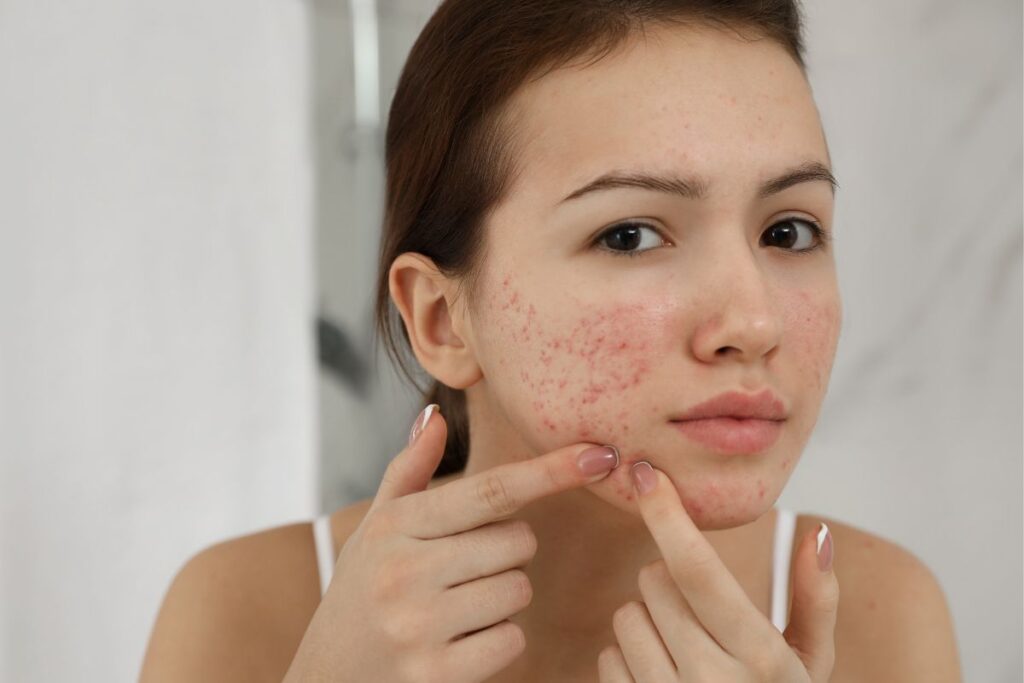Struggling with acne that won’t go away no matter what you try? You might feel helpless as breakouts keep appearing, but don’t lose hope just yet—acne is treatable. Let’s dive into the truth behind acne treatments and explore effective solutions that work for everyone, from teens to adults.
What is Acne?
Acne is a skin condition that causes pimples, blackheads, whiteheads, and cysts to form on the skin, especially on the face, neck, chest, and back. It occurs when hair follicles become clogged with oil, dead skin cells, and sometimes bacteria, leading to inflamed or infected areas on the skin. While acne is most common during puberty, it can occur at any age and can be a source of frustration for those who experience it.
Causes of Acne:
1. Hormonal Changes:
Puberty, pregnancy, and conditions like PCOS (polycystic ovary syndrome) trigger an increase in sebum production, which leads to acne.
2. Excess Oil Production:
Overactive sebaceous glands can clog pores, resulting in pimples.
3. Bacteria:
The bacterium Propionibacterium acnes can infect clogged pores, leading to inflammation and acne.
4. Dietary Factors:
High-glycemic foods, dairy products, and sugar can trigger acne flare-ups in some people.
5. Stress:
Stress stimulates hormone production, which can lead to more oil being produced, worsening acne.
Can Acne Be Cured?
While there’s no one-size-fits-all cure for acne, effective treatments can clear up acne and prevent future breakouts. Here’s what works:
1. Topical Treatments:
● Benzoyl Peroxide: This treatment kills the acne-causing bacteria and reduces inflammation.
● Salicylic Acid: A beta-hydroxy acid (BHA) that exfoliates and helps unclog pores.
● Retinoids: These vitamin A derivatives encourage cell turnover, preventing clogged pores.
● Tea Tree Oil: Known for its antibacterial properties, tea tree oil can help soothe acne-prone skin.
2. Oral Medications:
For moderate to severe acne, a doctor may prescribe:
● Antibiotics: These can help control bacterial growth and reduce inflammation.
● Oral contraceptives: Birth control tablets help women control their hormones, which in turn reduce acne.
● Isotretinoin: For severe acne that hasn’t responded to other treatments, this powerful medication can provide long-term relief but has potential side effects.
3. Professional Treatments:
● Laser Therapy: Reduces the production of oil by shrinking sebaceous glands (oil glands).
● Chemical peels: exfoliate the skin and clear blocked pores, reducing acne breakouts.
Frequently Asked Questions
Can acne be cured permanently?
Acne can be managed and controlled, but for many people, it may require long-term treatment to prevent flare-ups. With consistent care, the severity of acne can be greatly reduced.
What’s the best treatment for adult acne?
For adult acne, topical treatments like retinoids, benzoyl peroxide, and oral antibiotics can be effective. Hormonal treatment (like birth control pills) may also be helpful.
Does diet really affect acne?
Yes, high-sugar and high-dairy diets can trigger acne in some people. Reducing processed sugars and dairy may improve your skin.
How HealthPil Can Help:
At HealthPil, we connect you with top dermatologists who can create a customized treatment plan for your acne. Whether you need topical medications, oral treatments, or laser therapy, our experts will guide you on the most effective course of action for your skin.
Disclaimer:
This article is for informational purposes only. Always consult a healthcare provider for proper diagnosis and treatment of acne.

